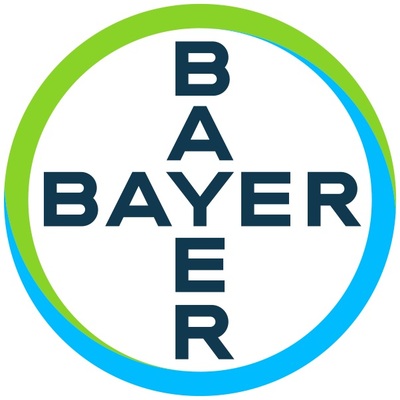Bayer announced the completion of the rolling submission of a New Drug Application to the U.S. Food and Drug Administration for the investigational drug darolutamide.
WHIPPANY, N.J., Feb. 27, 2019 /PRNewswire/ -- Bayer today announced the completion of the rolling submission of a New Drug Application (NDA) to the U.S. Food and Drug Administration (FDA) for the investigational drug darolutamide. The submission, which was initiated in December 2018, is based on data from the Phase III ARAMIS trial in men with non-metastatic castration-resistant prostate cancer (nmCRPC).1 These data were recently presented at the American Society of Clinical Oncology Genitourinary Cancers Symposium (ASCO GU) in San Francisco and published simultaneously in The New England Journal of Medicine.

"We are grateful to the patients, their families and the clinical investigators who have made this important study possible," said Scott Z. Fields, M.D., senior vice president and head of Oncology Development at Bayer's Pharmaceutical Division. "The NDA submission is a key milestone bringing us closer to providing darolutamide as a potential treatment option for men with nmCRPC."
Bayer has been granted Fast Track designation by the FDA for darolutamide in men with nmCRPC. Bayer is also in discussions with other health authorities regarding a submission of darolutamide. The compound is being developed jointly by Bayer and Orion Corporation, a globally operating Finnish pharmaceutical company.
About the ARAMIS trial
The ARAMIS trial is a randomized, Phase III, multi-center, double-blind, placebo-controlled trial evaluating the safety and efficacy of oral darolutamide in patients with nmCRPC who are currently being treated with androgen deprivation therapy (ADT) as standard of care and are at high risk for developing metastatic disease. 1,509 patients were randomized in a 2:1 ratio to receive 600 mg of darolutamide twice a day or placebo along with ADT.
The primary endpoint of this trial is metastasis-free survival (MFS) defined as time between randomization and evidence of metastasis or death. The secondary endpoints of this trial are overall survival (OS), time to pain progression, time to initiation of first cytotoxic chemotherapy, time to first symptomatic skeletal event (SSE), and characterization of the safety and tolerability of darolutamide.
About darolutamide
Darolutamide is an investigational, non-steroidal androgen receptor antagonist with a chemical structure that binds to the receptor and exhibits antagonistic activity, thereby inhibiting the receptor function and the growth of prostate cancer cells. A Phase 3 study in metastatic hormone-sensitive prostate cancer (ARASENS) is ongoing. Information about these trials can be found at www.clinicaltrials.gov.
Darolutamide is not approved by the U.S. FDA, the European Medicines Agency or any other health authority.
About castration-resistant prostate cancer (CRPC)
Prostate cancer is the second most commonly diagnosed malignancy in men worldwide.2 In 2018, an estimated 1.2 million men were diagnosed with prostate cancer, and about 358,000 died from the disease worldwide.2 Prostate cancer is the fifth leading cause of death from cancer in men.2 Prostate cancer results from the abnormal proliferation of cells within the prostate gland, which is part of a man's reproductive system.3 It mainly affects men over the age of 50, and the risk increases with age.4 Treatment options range from surgery to radiation treatment to therapy using hormone-receptor antagonists, i.e., substances that stop the formation of testosterone or prevent its effect at the target location.5 However, in nearly all cases, the cancer eventually becomes resistant to conventional hormone therapy.6
CRPC is an advanced form of the disease where the cancer keeps progressing even when the amount of testosterone is reduced to very low levels in the body. The field of treatment options for castration-resistant patients is evolving rapidly, but until recently, there have been no effective treatment options for CRPC patients who have rising prostate-specific antigen (PSA) levels while on ADT and no detectable metastases. In men with progressive nmCRPC, a short PSA doubling time has been consistently associated with reduced time to first metastasis and death.7
About Oncology at Bayer
Bayer is committed to delivering science for a better life by advancing a portfolio of innovative treatments. The oncology franchise at Bayer includes five marketed products and several other assets in various stages of clinical development. Together, these products reflect the company's approach to research, which prioritizes targets and pathways with the potential to impact the way that cancer is treated.
About Bayer
Bayer is a global enterprise with core competencies in the Life Science fields of health care and agriculture. Its products and services are designed to benefit people and improve their quality of life. At the same time, the Group aims to create value through innovation, growth and high earning power. Bayer is committed to the principles of sustainable development and to its social and ethical responsibilities as a corporate citizen. In fiscal 2017, the Group employed around 99,800 people and had sales of EUR 35.0 billion. Capital expenditures amounted to EUR 2.4 billion, R&D expenses to EUR 4.5 billion. For more information, go to www.bayer.us.
© 2019 Bayer
BAYER and the Bayer Cross are registered trademarks of Bayer.
Media Contact:
Rose Talarico, Tel. +1 862.404.5302
E-Mail: rose.talarico@bayer.com
Forward-Looking Statement
This news release may contain forward-looking statements based on current assumptions and forecasts made by Bayer Group or subgroup management. Various known and unknown risks, uncertainties and other factors could lead to material differences between the actual future results, financial situation, development or performance of the company and the estimates given here. These factors include those discussed in Bayer's public reports which are available on the Bayer website at www.bayer.com. The company assumes no liability whatsoever to update these forward-looking statements or to conform them to future events or developments.
References
- Fizazi, Karim; Shore, Neal; Tammela, Teuvo, et al. Darolutamide in Nonmetastatic Castration-Resistant Prostate Cancer. N Engl J Med. 2019; doi: 10.1056/NEJMoa1815671.
- GLOBOCAN 2018: Estimated Cancer Incidence, Mortality and Prevalence Worldwide in 2018. Prostate Cancer. http://gco.iarc.fr/today/data/pdf/fact-sheets/cancers/cancer-fact-sheets-19.pdf. Accessed February 2019.
- American Cancer Society. What is Prostate Cancer? https://www.cancer.org/content/dam/CRC/PDF/Public/8793.00.pdf. Accessed February 2019.
- American Cancer Society. Prostate Cancer Risk Factors. https://www.cancer.org/content/dam/CRC/PDF/Public/8794.00.pdf. Accessed February 2019.
- National Cancer Institute. Hormone Therapy for Prostate Cancer. https://www.cancer.gov/types/prostate/prostate-hormone-therapy-fact-sheet. Accessed February 2019.
- Nakazawa, Mary; Paller, Channing; Kyprianou, Natasha. Mechanisms of Therapeutic Resistance in Prostate Cancer. Curr Oncol Rep (2017) 19:13.
- Howard, Lauren; Moreira, Daniel M; DeHoedt, Amanda; Aronson, William J., et al. Thresholds for PSA doubling time in men with non-metastatic castration-resistant prostate cancer. BJU Int 2017;120: E80-E86.
Intended for U.S. Media Only
PP-DAR-US-0089-1 2/19
![]() View original content to download multimedia:http://www.prnewswire.com/news-releases/bayer-completes-rolling-submission-of-new-drug-application-to-us-food-and-drug-administration-for-investigational-drug-darolutamide-for-the-treatment-of-non-metastatic-castration-resistant-prostate-cancer-nmcrpc-300802946.html
View original content to download multimedia:http://www.prnewswire.com/news-releases/bayer-completes-rolling-submission-of-new-drug-application-to-us-food-and-drug-administration-for-investigational-drug-darolutamide-for-the-treatment-of-non-metastatic-castration-resistant-prostate-cancer-nmcrpc-300802946.html
SOURCE Bayer




